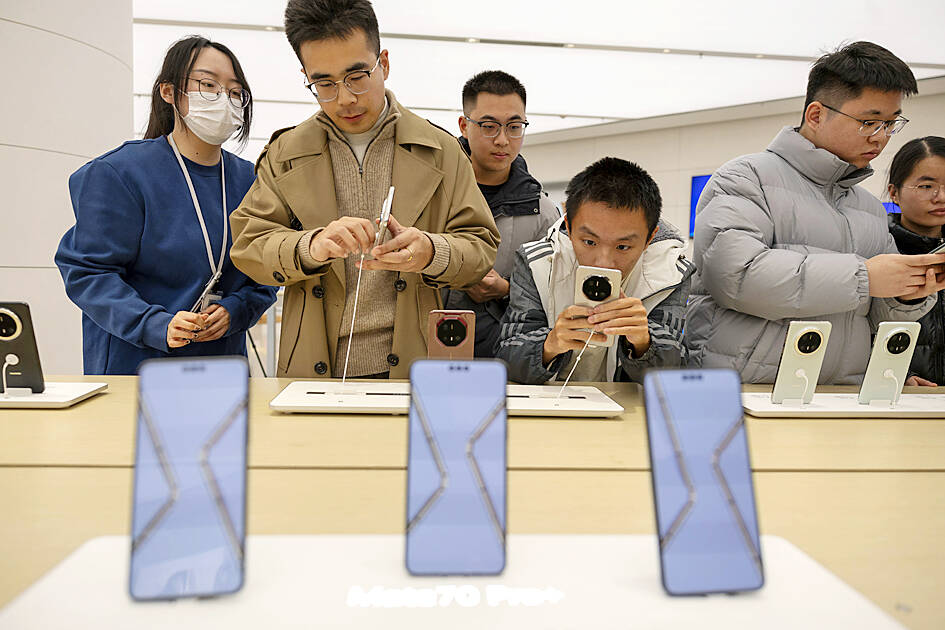China is to subsidize more consumer products and boost funding for industrial equipment upgrades, ramping up a program to bolster domestic consumption in the face of growing headwinds for exports.
Consumers would qualify for a 15 percent subsidy for buying new mobile phones, tablets and smartwatches under 6,000 yuan (US$818) this year, according to an official notice published yesterday by the Chinese National Development and Reform Commission (NDRC) and the Chinese Ministry of Finance. The benefit is capped at 500 yuan for up to one device in each category.
The authorities would also expand the types of home appliances eligible for state support to 12 from eight last year to include products such as dishwashers and rice cookers, the notice said.

Photo: EPA-EFE
The two other new consumer goods covered by the initiative this year are microwaves and water purifiers. Consumers would also get more cash compensation from the government for spending on decoration materials to refurbish homes, the notice said.
China has made boosting consumption a higher priority this year as it looks to fight deflation amid subdued household and business confidence. Exports as a growth engine might also lose steam as trade tensions with the US would likely intensify with US president-elect Donald Trump returning to the White House later this month.
A trade-in subsidy for electric vehicles (EVs) and hybrids was also renewed. The cash-for-clunkers program gave a big boost to sales — especially of EVs and hybrids — after its introduction last year, with more than 3.7 million vehicles purchased under the program.
New agricultural machines have also been added under an initiative to subsidize industrial equipment upgrades. Companies in sectors such as electronic information and work safety are included to get the benefit this year.
NDRC Vice Chairman Zhao Chenxin (趙辰昕) said yesterday the program plays an important role in “expanding effective investment, boosting consumer demand, promoting green transformation, and improving people’s livelihood.”
Investors were unimpressed by the latest effort, sending stocks tumbling in the morning. They erased the losses briefly in afternoon trading on purchases by exchange traded funds known to be favored by the “national team” before falling again. The Shanghai Composite index barely moved at the close, while Hong Kong’s Hang Seng Index dropped nearly 1 percent.
The authorities would continue to distribute ultra-long special sovereign bond funds among local governments to help them hand out subsidies to consumers under the program this year, the notice said.
The central government has already extended 81 billion yuan to local authorities to support the program this year, senior Chinese Ministry of Finance official Fu Jinling (傅金玲) said at the briefing.
The authorities would also arrange funds raised from the sales of ultra-long sovereign special bonds to provide loan discounts for companies to upgrade to new equipment on top of the 1.5 percent compensation already offered by the central government, the ministry said.

Intel Corp chief executive officer Lip-Bu Tan (陳立武) is expected to meet with Taiwanese suppliers next month in conjunction with the opening of the Computex Taipei trade show, supply chain sources said on Monday. The visit, the first for Tan to Taiwan since assuming his new post last month, would be aimed at enhancing Intel’s ties with suppliers in Taiwan as he attempts to help turn around the struggling US chipmaker, the sources said. Tan is to hold a banquet to celebrate Intel’s 40-year presence in Taiwan before Computex opens on May 20 and invite dozens of Taiwanese suppliers to exchange views

Application-specific integrated circuit designer Faraday Technology Corp (智原) yesterday said that although revenue this quarter would decline 30 percent from last quarter, it retained its full-year forecast of revenue growth of 100 percent. The company attributed the quarterly drop to a slowdown in customers’ production of chips using Faraday’s advanced packaging technology. The company is still confident about its revenue growth this year, given its strong “design-win” — or the projects it won to help customers design their chips, Faraday president Steve Wang (王國雍) told an online earnings conference. “The design-win this year is better than we expected. We believe we will win

Chizuko Kimura has become the first female sushi chef in the world to win a Michelin star, fulfilling a promise she made to her dying husband to continue his legacy. The 54-year-old Japanese chef regained the Michelin star her late husband, Shunei Kimura, won three years ago for their Sushi Shunei restaurant in Paris. For Shunei Kimura, the star was a dream come true. However, the joy was short-lived. He died from cancer just three months later in June 2022. He was 65. The following year, the restaurant in the heart of Montmartre lost its star rating. Chizuko Kimura insisted that the new star is still down

While China’s leaders use their economic and political might to fight US President Donald Trump’s trade war “to the end,” its army of social media soldiers are embarking on a more humorous campaign online. Trump’s tariff blitz has seen Washington and Beijing impose eye-watering duties on imports from the other, fanning a standoff between the economic superpowers that has sparked global recession fears and sent markets into a tailspin. Trump says his policy is a response to years of being “ripped off” by other countries and aims to bring manufacturing to the US, forcing companies to employ US workers. However, China’s online warriors